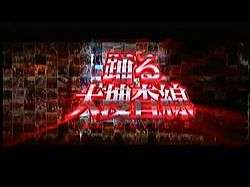Bayside Shakedown
| Odoru Daisōsasen (Bayside Shakedown) | |
|---|---|
 Title Screen | |
| Genre | Police Drama |
| Developed by | Ryōichi Kimizuka |
| Starring | Yuji Oda |
| Opening theme | Akihiko Matsumoto, "Rhythm And Police" |
| Ending theme | Yuji Oda with Maxi Priest, "Love Somebody" |
| Country of origin | Japan |
| Original language(s) | Japanese |
| No. of seasons | 1 |
| No. of episodes | 11 |
| Production | |
| Producer(s) | Chihiro Kameyama |
| Running time | 1 hour |
| Distributor | Fuji Television |
| Release | |
| Audio format | Stereo |
| First shown in | 7 January–March 18, 1997 |
| Chronology | |
| Followed by | Bayside Shakedown: The Movie |
Bayside Shakedown (踊る大捜査線 Odoru Daisōsasen) is a Japanese police drama/comedy series originally broadcast by the Fuji Television group in 1997. The series was so popular that three TV movies, a stage play and six theatrical-release movies were made following the end of the TV series. The first theatrical release was in 1998, the second in 2003, the third and fourth (spin-off movies featuring single characters from the franchise) in 2005, the fifth in 2010, the sixth and last released in 2012.
In 1998 and 1999, an English-subtitled version of the series was broadcast in the United States on the International Channel as "The Spirited Criminal Investigative Network".
The first movie, Bayside Shakedown The Movie, was a major box office hit in Japan, earning 10.1 billion yen (84 million U.S. dollars), and was the third highest grossing live-action film in Japanese box office history.[1] DVD and video sales were also very high. Bayside Shakedown 2 is the highest grossing non-animated Japanese movie on domestic screens and earned over $165 million at the box office.[2]
Story summary
Bayside Shakedown takes place in the fictional Wangan Precinct of the Tokyo Metropolitan Police Department. Unlike most police dramas which tend to focus on action and car chases, Bayside Shakedown is largely concerned with the bureaucratic issues of the police department that are very present in many other sectors of Japanese society. The series depicted police work as office politics under a slightly different environment, complete with bureaucratic red tape, lethargic civil servants, bosses more interested in playing golf and saving face than solving crimes, interference from politicians, and conflict between police headquarters and the local officers.
The officers depicted in Bayside Shakedown are only permitted to carry firearms during major emergencies. Fuji TV used the fictional "All officers are to be armed" (拳銃携帯命令 Kenjū Keitai Meirei) order, which the portrayed bureaucracy is often reluctant to hand down. (In reality, it is compulsory for a uniformed officer to be armed, and plainclothes officers are required to be armed if they expect to be exposed to any danger.)
The main character of the series is a young detective named Shunsaku Aoshima (played by Yuji Oda). Originally a corporate salesman, Aoshima decided to join the police department out of heroic idealism, expecting a life of adventure and excitement. Once inside, he is completely underwhelmed by the reality of police work, finding it dishearteningly similar to corporate employment. Throughout the series, he strives against the obstacles of bureaucratic indifference to help people and pursue his ideals of what a police officer should be, often with humorous results.
Timeline
1997 January–March: TV Drama.
1997 December: Special episode, Bayside Shakedown: Year-End Special Alert
1998 June: Extra episode, Bayside Shakedown: Wangan Police Station Female Police Officers' Story.
1998 October: Special episode, Bayside Shakedown: Autumn Campaign for Crime Eradication
1998 October: Bayside Shakedown: The Movie
2003 Summer: Bayside Shakedown 2.
2005 Summer: Two "spin-off" movies which are part of The Odoru Legend Continues. The first titled Tokyo Subway Panic (also known as Negotiator) was released in June. It is based on the character of Mashita as a police negotiator. The second movie The Suspect which was released in August is based on the character of Muroi. Another spin-off, Tobosha Joichiro Kijima was recorded for the DVD release of the Tokyo Subway Panic.
2007: For a Japanese variety show, Trivia no Izumi, a new spin-off was made for a minor character from Tokyo Subway Panic (who did not even have a name at the time), titled Keigokan Uchida Shinzo.
2010 Summer: Bayside Shakedown 3.
2012 September: The last ever TV special, Bayside Shakedown THE LAST TV Salaryman keiji to saigo no nanjiken. Some of the original cast members reunite after 14 years.[3]
2012 September: The last ever movie for Bayside Shakedown which is Bayside Shakedown The Final.
References
- ↑ "Odoru Daisousasen 3" earns close to 1 billion yen in opening weekend". Tokyograph. 5 July 2010. Retrieved 2012-08-31.
- ↑ "歴代ランキング - CINEMAランキング通信". Kogyotsushin.com. Retrieved 2012-08-31.
- ↑ http://www.odoru.com/tv/introduction.html